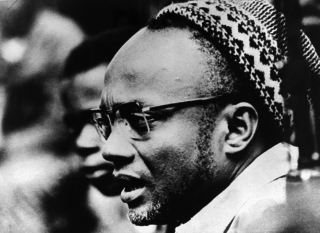The Liberation Front of Guinea (Portuguese:Frente de Libertação da Guiné, FLG) was a political party in Guinea-Bissau, the part of Portuguese Guinea, formed to seek independence from Portugal.

Guinea-Bissau, officially the Republic of Guinea-Bissau, is a country in West Africa that covers 36,125 square kilometres (13,948 sq mi) with an estimated population of 1,815,698.

Portuguese Guinea, called the Overseas Province of Guinea from 1951, was a West African colony of Portugal from the late 15th century until 10 September 1974, when it gained independence as Guinea-Bissau.
It was created in 1961 from the union of the Liberation Movement of Guinea (Movimento de Libertação da Guiné) (MLG) headed by Francois Kankoila Mendy and the African Democratic Rally of Guinea (Rassemblement Democratique Africain de la Guinee) (RDAG). On 3 August 1962 FLG merged in turn with six other parties to form the Struggle Front for the National Independence of Guinea (Frente de Luta pela Independência Nacional da Guiné, FLING) [1]

The Struggle Front for the National Independence of Guinea was a political movement in Guinea-Bissau. Founded by groups opposed to the Marxist doctrine of Amílcar Cabral and the African Party for the Independence of Guinea and Cape Verde (PAIGC), FLING played a minor role in the national liberation struggle against Portuguese colonial rule.



